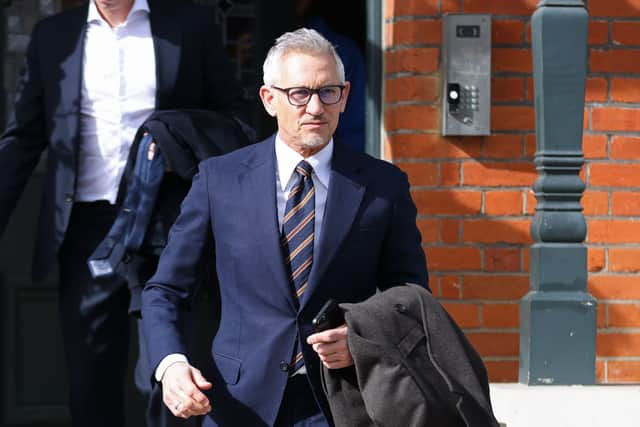BBC licence payers, not Lineker, are being robbed of their freedom of expression
and live on Freeview channel 276
Gary Lineker is the lucky one - he has abundant freedom of expression unlike mere mortal citizens whose right to choose is cancelled by a forced tax to pay for the BBC. We should applaud him for exposing - accidentally, no doubt - the inequality in the exercise of freedom of speech and freedom of expression.
As a big noise in football Lineker unhesitantly grabs every chance to promote his random views - along with the similarly spontaneous thoughts of actors, chat show hosts and influencers. Of course the public can exercise its freedom by avoiding social media platforms in general and the inane dribblings of B-list celebrities in particular.
Advertisement
Hide AdAdvertisement
Hide AdHowever in one respect most of the country’s other 70 million citizens have neither the freedom of getting their voice heard nor the freedom to choose the media they consume. Lineker’s freedom is not the issue.
It is instead the BBC’s suppression of the right to choose which media to pay for by continuing to insist on the forced tax of the licence fee. The BBC has been protected from the structural change in the media over two decades, devouring £4 billion a year and clinging to a monopoly position in news supply that suppresses diversity and choice.
The Lineker episode exposes this undemocratic and unaccountable institution that is dependent on taxation without representation. The joke is that the chairman Richard Sharp was probably sent in by Boris Johnston to sort it out but he was instantly sucked into the cultural swamp of smug infallibility that characterises an archaic institution that will stop at nothing to survive.
The BBC pillars of defence are its mission of universality, something for everyone, clearly a ludicrous boast in an era that provides multiple choice from infinite sources. Then there is much heralded defence of upholding impartiality on which the BBC is repeatedly impaled.
Advertisement
Hide AdAdvertisement
Hide AdThere is no such thing as impartiality - balance, fairness, truth, yes - but every journalistic judgement is a subjective one: the inclusion or otherwise of stories, the running order, the presenter’s body language. The only genuine way to achieve impartiality is through giving the consumer choice.


Paying a compulsory licence fee for a single broadcast service, enforced through an questionable law that insists the fee is payable to watch any live TV from any provider, is an attack on individual freedom. The BBC’s third mythical defence is to say the matter can be discussed at charter renewal in 2027.
It is self-evident that by then the BBC will have destroyed what little of value that remains - its latest cost cutting attack on classical music is proof enough. What is more sinister is the BBC’s mission creep aimed at dominating online news where it has identified increasingly weak competitors particularly in local markets.
The News Media Association, a traditionally anonymous body that belies its prestigious membership, including The Times, The Guardian and the Daily Mail, has finally awoken from its slumbers to consider a legal challenge to the BBC’s use of taxpayer cash to extinguish competition from commercial publishers.
Advertisement
Hide AdAdvertisement
Hide AdThe BBC’s online news service, fuelled by extravagantly resourced superior technology, thousands of journalists and scores of advertising free websites, has systematically stripped audiences away from commercial publishers. Its latest assault on local publishers, BBC Across the UK, targets 32 locations with the likelihood that more newspapers will disappear as a result.
In real terms the BBC is trying to empower time-serving wonks in Portland Place, London, to direct news coverage in the likes of Bradford, Wolverhampton, Sunderland and Peterborough to replace resident and independent newspaper editors with decades of service to, and unique knowledge of their local communities.
This is the consequence of an uncontrolled institution seeking justification for a forced tax and picking on small news providers rather than real competitors like Netflix, Sky or Amazon. Politicians may well be fans of Gary Lineker but if they examine the rest of the BBC TV schedule - and it is TV programming that the public supposedly pay for - they will find a service dominated by repeats of Top of the Pops from the 1980s, minus certain DJs - old movies and cookery shows, most of which can be found on numerous other channels and frequently free online.
Government should immediately sweep away the BBC’s multiple excuses, and thereby its threadbare service, by the substitution of the licence fee with a voluntary subscription so it can begin to earn an honest living. Then all citizens, not just Lineker, could have the right to express themselves.
Comment Guidelines
National World encourages reader discussion on our stories. User feedback, insights and back-and-forth exchanges add a rich layer of context to reporting. Please review our Community Guidelines before commenting.